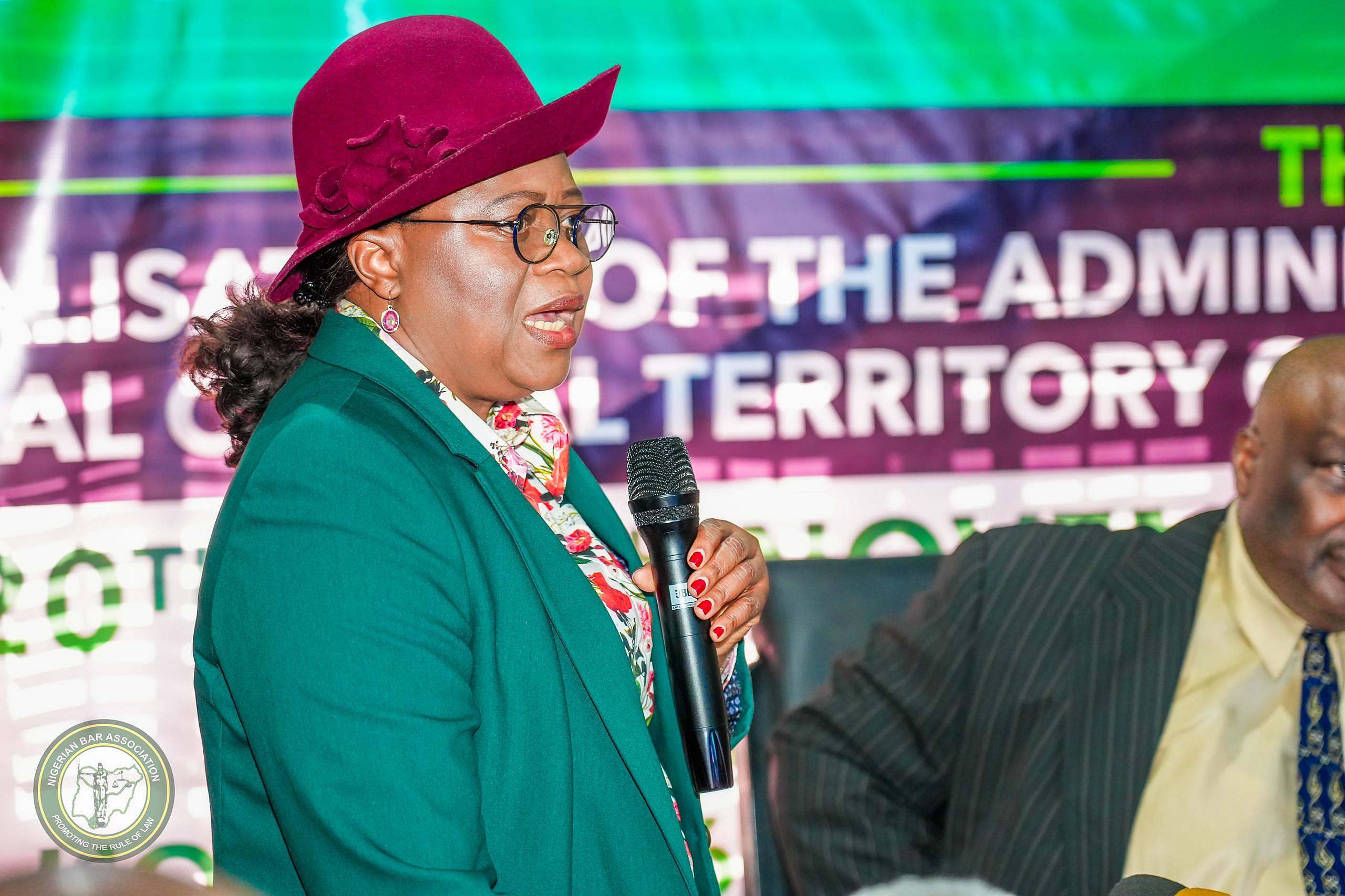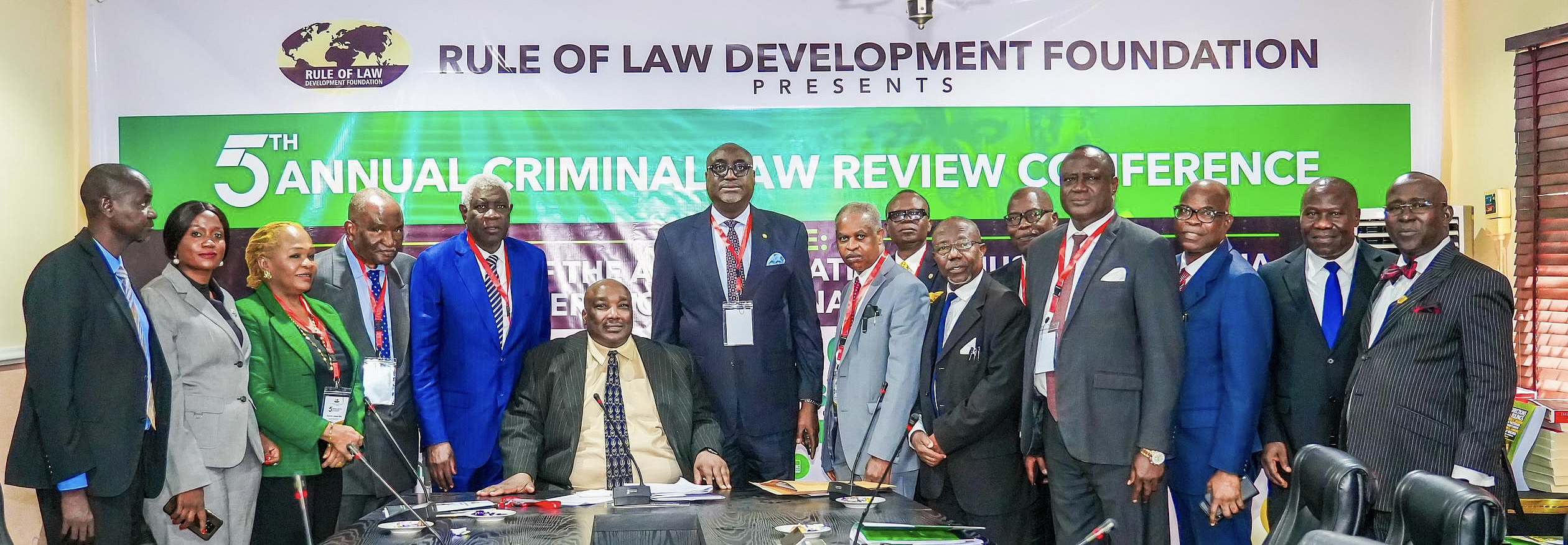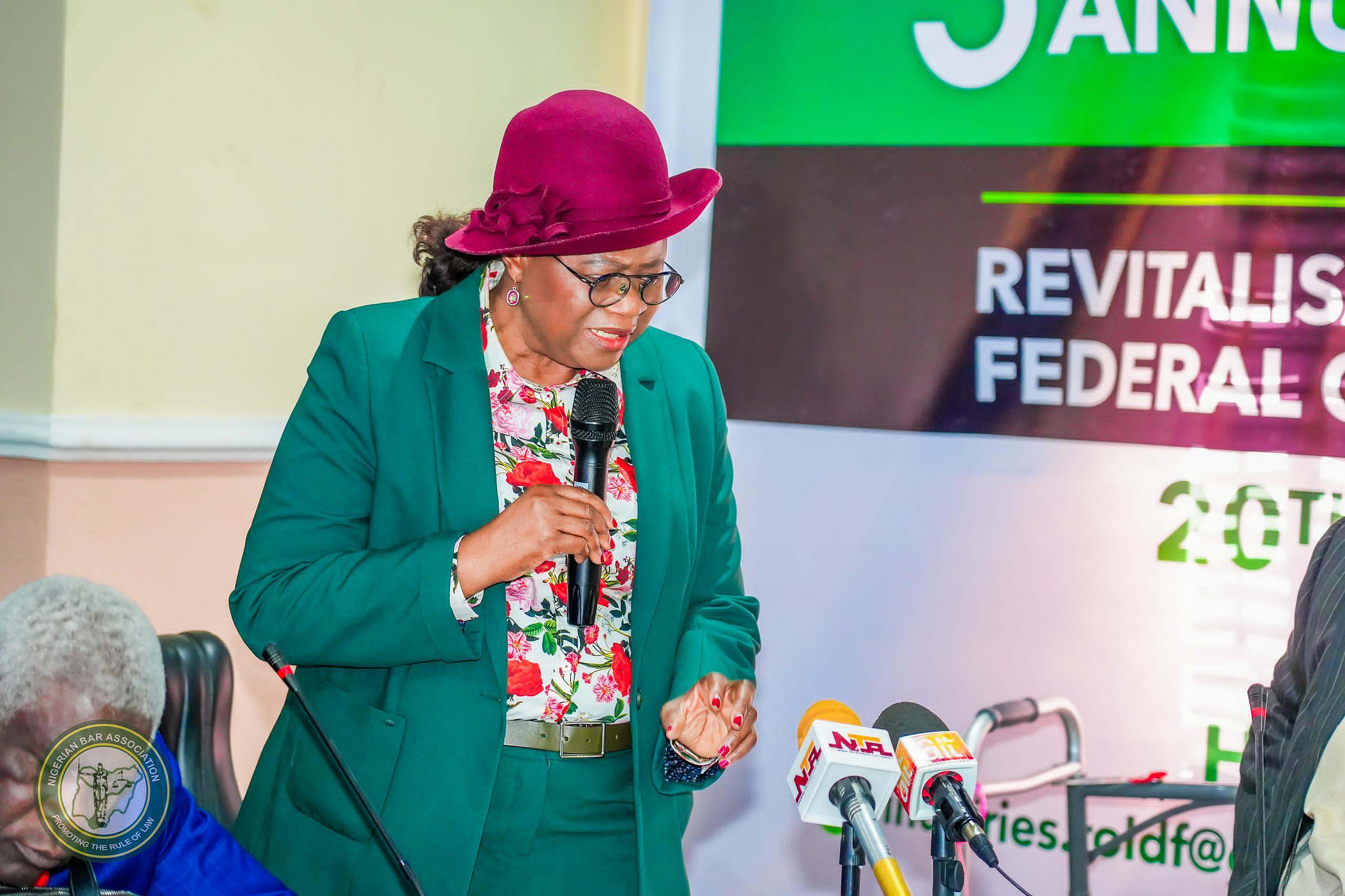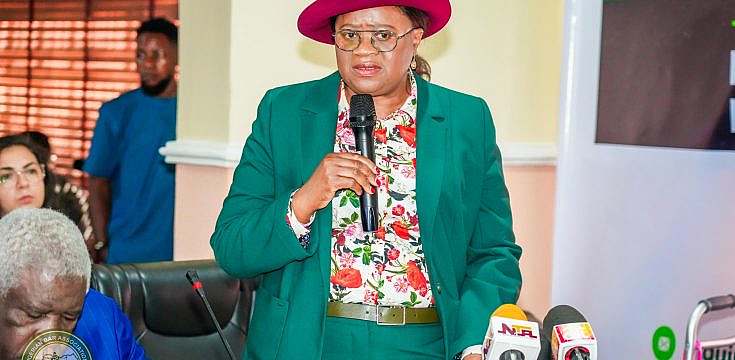SPECIAL GOODWILL REMARKS BY HON. JUSTICE M.B.DONGBAN-MENSEM CFR, JP+, THE HONOURABLE PRESIDENT OF THE COURT OF APPEAL AT THE 5TH RULE OF LAW DEVELOPMENT FOUNDATION ANNUAL CRIMINAL LAW REVIEW CONFERENCE 2023.
I appreciate the Almighty God for the opportunity and privilege to be a part of this program today. I am also deeply grateful to the Coordinator of the Rule of Law Development Foundation and former President of the Nigerian Bar Association, Joseph Bodunrin Daudu, SAN and his team for extending an invitation to me to deliver a special goodwill message at this opening ceremony of the Foundation’s 5th Annual Criminal Law Review Conference, 2023.
I am delighted that this Conference, themed Revitalization of the Administration of Justice in Nigeria: Federal Capital Territory Criminal Justice System in Focus, is in its fifth iteration since its inception in 2019.
I commend the foundation for remaining committed to the reform of the administration of justice and a collaborator for the sustenance of the Rule of Law in the FCT and our Nation at large. The Rule of Law Development Foundation’s mandate is to promote the development of the Rule of Law in Nigeria, Africa and the world.
The foundation also avowedly helps to promote and encourage legislative advocacy skills within the ambit of the Rule of Law, and most importantly advocate for justice sector reforms within Nigeria. These statements of intent show that the foundation not only talks but also walks the talk.
I say this because the Judiciary as an institution cannot speak aloud as the other two arms do. Far from being garrulous, the Third Arm seeks to be seen only through the effect that it has on entrenching the law and ensuring order. To have advocates that aim to institutionalize the Rule of Law in the Nigerian body politic is therefore akin to having knights in a proverbial army that fights for organized, civilized development of our nation. RULE OF LAW.
It has been observed that the phrase “Rule of Law” could be controversial to define. There is a lot of debate in contemporary legal theory about its meaning. I am not here to advance the controversy. Although this is not an occasion to attempt an exhaustive definition of “Rule of Law” as a phrase. It is, however, sufficient to say that the Rule of Law has a core meaning, which can be traced back to the ancients. As far back as 360 BC, Plato wrote in “Laws”. “For that state in which the law is subject and has no authority, I perceive to be on the highway to ruin; but I see that the state in which the law is above the rulers, and the rulers are the inferiors of the law, has salvation, and every blessing which the Gods can confer.”1.
This axiom has been repeated – in some form or another throughout the centuries.
For Dicey, the great English constitutional scholar, the Rule of Law meant that “no man is above the law [and] every man, whatever be his rank or condition, is subject to the ordinary law of the realm and amenable to the jurisdiction of ordinary tribunals.”2
In the 2004 Report of the Secretary General of the United Nations, the concept of the rule of law was defined as: “….a principle of governance in which all persons, institutions and entities, public and private, including the State itself, are accountable to laws that are publicly promulgated, equally enforced and independently adjudicated, and which are consistent with international human rights norms and standards. It requires, as well, measures to ensure adherence to the principles of supremacy of law, equality before the law, accountability to the law, fairness in the application of the law, separation of powers, participation in decision-making, legal certainty, avoidance of arbitrariness and procedural and legal transparency. “3.
COLLABORATION
The Rule of Law is founded on political commitment. The Government follows the law according to its best understanding of the law, which is based on legal advice. The Attorney General (AG) and the office of the Attorney General have the constitutional duty to advise the Government on legal matters.
Under the principle of the rule of law, the judges, lawyers and citizens all have a role to play to ensure its success. Even though the judges work for the government, they are not Law enforcement officers.
Their responsibility is to see that the rule of the Court procedures is followed without being influenced by public perception or their own person views. The citizens have a duty to imbibe a deliberate and conscious culture of upholding the law of the land by obeying the law individually. Section 24 of the 1999 Constitution (as amended specified duties of a Citizen which include among others to –
a) Abide by the Constitution, respect its ideals and its institutions such as the National Flag, the National Anthem, the National Pledge, and legitimate authorities;
b) Help to enhance the power, prestige and good name of Nigeria by defending Nigeria and rendering such national services as may be required
c) Respect the dignity of other citizens and the rights and legitimate interests of others and live in unity and harmony and in the spirit of common brotherhood;
d) Make positive and useful contribution to the advancement, progress and well- being of the community where they reside; and
e) Render assistance to appropriate and lawful agencies in the maintenance of law and order.
INDEPENDENCE OF THE JUDICIARY
An independent judiciary is necessary to ensure the Rule of Law is respected. The Judiciary is aware of its responsibilities. An independent Judiciary is absolutely essential to the rule of law’. Critics routinely assert that judicial independence is not possible given the current system of judicial appointments.
The only answer to this kind of theoretical comments is that they do not necessarily reflect realities. Judges have frequently expressed their decisions and rulings in terms of what the rule of law’ requires. Whatever their personal political persuasions, judges do not let political considerations influence their decisions. Judges must not be subjected to pressure and influence and they must be disposed to make impartial decisions based solely on fact and Law.
The citizen must show respect to the Court being an institution set up by the Constitution. Citizens must assist by promptly obeying court orders and assisting in keeping the society orderly by reporting any breach by other individuals to relevant agencies. Citizens should always volunteer to give evidence in court whenever the need arises.
Where the citizens do their part and law enforcement agencies deliberately destroy a case in order to frustrate the complainant, there should be application of appropriate sanction.
The lawyers as ministers in the temple of justice have a duty to assist the court by avoiding unnecessary actions which will undermine the judicial process and also make effort to save the precious time of the court. This can be achieved by not engaging in filing and prosecuting frivolous cases which often times stretch from the trial Court to the Supreme Court.
The lawyers are duty bound to have reverence to the law by not commenting on cases which are sub judice either to the media or other avenues.
They should wait until the Court delivers its judgment before their analysis. Lawyers are also obliged to not only encourage their clients about their rights but also about their obligations to others and the society.
It is worrisome how some Lawyers approach the Court of Appeal or Supreme Court for review of its own judgement without regard to the finality embedded in the powers of the Court of Appeal in respect of appeals arising from the National and State Houses of Assembly election petitions as provided by Section 246(3) of the 1999 Constitution (as amended) and that of the Supreme Court in all other matters by virtue of section 235 of the Constitution of the Federal Republic of Nigeria, 1999 (as amended). The Supreme Court cannot sit on appeal over its own judgment.
The provision gives a stamp of finality to any decision of the Supreme Court. There is no constitutional provision for the review of the judgment of the Supreme Court by itself. However, the Supreme Court possesses inherent power to set aside its judgment in appropriate cases but that such inherent jurisdiction cannot be converted into an appellate jurisdiction as though the matter before it is another appeal, intended to afford the losing litigants yet another opportunity to re-state or re-argue their appeal. See CITEC INT’L ESTATES LTD. V. FRANCIS (2014) 8 NWLR (PT. 1408) 139. The appropriate cases as held by the Supreme Court in KALU IGWE & 2 ORS V. CHIEF OKUWA KALU & 3 ORS (2002) 14 NWLR (PT. 787) 435 are: when the judgment is obtained by fraud or deceit either in the court or of one or more of the parties; when the judgment is a nullity. A person affected by an order of court which can properly be described as a nullity is entitled ex debito justitiae to have it set aside; and when it is obvious that the court was misled into giving judgment under a mistaken belief that the parties consented to it. For a lawyer to make an application to the Court for review of its judgment outside the laid down conditions is a gross abuse of court process, undermining the rule of law and encouraging disregard of the rule by their clients, thereby inducing chaos.
In DEGI-ERMIENYO V. P.D.P. (2021) 16 NWLR (PT. 1800) 387 Where application was brought to the Supreme Court to review its decision, his Lordship Augie, JSC held that: “As it is, I cannot believe, and I say this with tears in my eyes, I cannot believe that in my lifetime I would see very senior members of the Bar bring applications of this nature to this court which are aimed at desecrating the sanctity of this court; violating the well-known principle that the decisions of this court are final; and destroying the esteem, with which this court is held.
The two applications filed by the two sets of applicants are vexatious they are frivolous; and they are without doubt, a gross abuse of court process in the circumstances, the said two applications are hereby dismissed. Costs of N10 Million Naira each are awarded against the first and second applicants and the third applicant respectively, and in favour of the first, second and third respondents to be paid personally by their respective counsel.” As noted above, the Learned Silks were ordered to pay the costs personally. This order is highly commendable as it shows the gravity of such actions which are aimed towards undermining the potency of the Court and by implication the rule of law.
As noted above, the Learned Silks were ordered to pay the costs personally. This order is highly commendable as it shows the gravity of such actions which are aimed towards undermining the potency of the Court and by implication the rule of law.
In B.L.L.S.CO.LTD.V.M.V.WESTERNSTAR (2019) 9 NWLR (PT.1678) 489 per Okoro, JSC stated that:“I do not see anything technical about making it mandatory for legal practitioners to obey the law and do the correct thing. There is also no injustice in urging counsel to comply with the requirement of the law.”
Section 6 (6) of the 1999 Constitution (as amended) provided that: “The judicial powers vested in accordance with the foregoing provisions of this section (a) shall extend, notwithstanding anything to the contrary in this constitution, to all inherent powers and sanctions of a court of law;”
APPLICATION.
The Courts are responsible for interpreting the law and in doing so, the courts must ensure that the law is applied accurately and consistently in all cases and justice is served fairly and impartially by ensuring the law is applied equally to all citizens, regardless of their status or background. The learned Silk Muiz Banire in an Article published 12th October, 2023 titled: “Is Judiciary truly a lost hope of the common man” stated that: “the absence of the Rule of law signifies the substitution of the rule of man.
The import of this is the subjection of the conduct of state affairs and that of the citizens to the dictates of man”.
Where the Rule of Law is undermined, the principle of might over right becomes expedient. The result will be the pungency of anarchism and the de-civilization of the society. Thus, I would posit that the displacement of the Rule of Law, or the undermining of the judiciary is directly proportionate to the rise of disorder in the nation today.
A principle linked with the rule of law is expedient delivery of justice without interference, intimidation, manipulation or fear. The environment must be conducive for such to be achieved. That is why, as President of the Court of Appeal, in an effort to secure us from harm and possible threats to the Rule of Law, the determination of sensitive political appeals is now concentrated in the Abuja and Lagos Divisions of the Court.
The Learned Justices involved in such appeals are not notified of their case dockets until close to the hearing. This not only insulates their Lordships from undue pressures but also secures them from undue threats to their persons. Beyond this, it demonstrates my determination to see to it that justice is not only done but seen to be done, without fear or favour, affection or ill will.
ADMINISTRATION OF JUSTICE SYSTEM
The Black’s Law Dictionary 8th Edition define the Administration of Justice as the maintenance of right within a political community by means of the physical force of the state; the state’s application of the sanction of force to the rule of right.
When the rule of law is gotten right, then the resultant effect will be the revitalization of our Administration of Justice system. If the Citizen performs his duty as mandated by the Constitution, the security agencies carry out their role as prescribed by the Acts establishing them and the Administration of Criminal Justice Act, 2015, the Lawyers also brazen up to do what the law demands, then the vitality of the justice system will be eminent.
The coming into effect of the Administration of Criminal Justice Act, 2015 have brought innovations which have remedied some of the lapses.
Alexander Hamilton, a founding father of the United States, noted that “the first duty of society is justice and I agree. Justice is the bedrock of a civilised society anchored on respect for law and order. Its administration is the vein that sustains what would otherwise be an amorphous, formless concept.
Nowhere is this more evident than in how a nation administers its criminal justice system. Far more than this, how a justice system specifically respects the rights of its citizens, whether suspected, accused, innocent or guilty, is a barometer for how it respects the Rule of Law.
With the coming into force of the Administration of Criminal Justice Act 2015, the Honourable Chief Judge of the Federal Capital Territory High Court issued the Practice Direction for Administration of Criminal Justice Act (2017) to carry into effect and ensure compliance with the Overriding Objective of the Administration of Criminal Justice Act 2015, particularly in:
- ensuring efficiency and speed in the case management of criminal trials and dispensation of justice,
- protecting the interests and fundamental human rights of the defendant, victim, witnesses and society; particularly the right to fair hearing, and
- ensuring active participation of all parties to focus on matters that are genuinely issues for trial thereby reducing delays and expenses.
This is in consonance wit Section 1 (1)!of the Administration of Criminal Justice Act 2015 which provides that:
(l) The purpose of this Act is to ensure that the system of administration of criminal justice in Nigeria promotes efficient management of criminal justice institutions, speedy dispensation of justice, protection of the society from crime and protection of the rights and interests of the suspect, the defendant, and the victim.”
WORKING WITH AGENCIES
Criminal Justice covers a wide purview as there are several institutional frame work which comes together for its execution such as the security agencies responsible for law enforcement, the Courts and the Prison/Correctional Services, which were mandated by section 1 (2) of the Administration of Criminal Justice Act 2015 to ensure compliance with its provisions for the realisation of its purpose.
The Act has come up with some commendable innovations in the Administration of Criminal justice some of which include:
• Establishment of the Administration of Criminal Justice Monitoring Committee consisting of various actors in the administration of justice, the Chief Judge of the FCT being the Chairman which is mandated to ensure effective and efficient application of the Act by the relevant agencies.
A strict supervision by the Committee, checkmating and sensitizing their subordinates on the innovations will give the Criminal Justice Administration in the Federal Capital Territory a great leap.
•The Act also made provision for the expedient hearing of criminal trials by providing that upon arraignment, the trial of the Defendant shall proceed from day to day until the conclusion;
•Establishment within Nigeria Police a Central Criminal Record Registry of all arrests made by the Police and prohibiting the arrest of a person in place of a suspect; compensation of the victim of a crime by the convict.
It also addresses the problem of superfluous use of incarceration as a punishment or correctional method by introducing some alternatives to imprisonment such as suspended sentence, community service, parole and probation.
Further, that the Court, in exercising its power shall have regard to the need to:
•reduce congestion in prisons;
•rehabilitate prisoners by making them to undertake productive work;
•prevent convict who commit simple offences from fraternisation with hardened criminals.
RIGHTS OF THE SUSPECT.
The law enforcement/security agents are the gate way in the administration of Criminal Justice in the sense that they are the first to come in contact with the suspect from the level of investigation to arrest and possible prosecution. In performing those roles, they have to be mindful of the rights of the suspect which are fortified by the 1999 Constitution of the Federal Republic of Nigeria (as Amended). And these rights include:
- the right to information
- the right to interpretation
- the right to have a lawyer
- the right to be resumed innocent
- the right to be present at trial
The Act has made proceedings professional and constricted by limiting the power to prosecute to only legal Practitioners. Private Legal Practitioners through the authority of the Attorney-General can prosecute under the Act.
When such Fiat is received by a Private Legal Practitioner, he should bear in mind that he is rendering service to the nation and do so diligently. The Bar also has a role to play in ensuring conformity with the rights of individuals and relevant provisions of the Act by calling the attention of the Committee any time there is a breach.
The FCT High Court Practice Direction made it clear that the court shall schedule the time and date of the hearings on such days and times with the aim of concluding the trial within 180 days after the arraignment.
Also, that not more than five adjournments may be allowed from arraignment to final judgment. Order 1 Rule 2 of the Practice Direction specified that it shall apply to all criminal trials in the Magistrates Courts, High Courts, Upper Area Courts and other courts that try criminal cases in the Federal Capital Territory.
SENTIMENTS AND THREATS
It has become an imperative to emphasize that it is never appropriate for sentiments such as anger, disgust, fear, hatred, joy, love, sadness to affect judicial decision-making. In our judicial traditions, legal rules are understood as impersonal, and judges embody impartial legal authority.
In our judicial traditions, legal rules are understood as impersonal, and judges embody impartial legal authority.
Emotions are viewed as inherently absurd, disorderly, impulsive and personal, and therefore inconsistent with the objectivity necessary for impartial, legitimate exercise of judicial authority. Terry A. Maroney was apt when he spelt out that ” whether a judge is assessing evidence, applying law, making a final decision or an interim order, or engaging with others in the courtroom, personal views, biases, values and emotions should be set aside. From this perspective, outward displays of emotion or reliance on emotion in decision-making are inconsistent with legal reasoning and the rational application oflaw.4.
Judicial work requires managing one’s own emotions and conduct and can demand management of others’ emotions and behaviours, whether litigants, lawyers, the public or others. The judge must effectively anticipate and respond to others” emotional reactions including when framing and communicating decisions. All these are necessary for the observance of the Rule of Law.
I am aware of the recent and increase in the challenges of the judiciary orchestrated by the Social Media. There has been a dramatic increase in the number of organized protested and threats of violence to judges. Much of this increase appears to be driven by widespread use of the internet and social media and the polarized political climate.
It is true that the judiciary already has its own safety education programme that covers a wide range of threats. In addition, all new judges and newly promoted chief judges are educated in how to reduce their exposure and how to maintain low profile while, nevertheless, to be safe at home and in the courthouse, judges and their families need a greater level of assistance and resources that only the two other arms of government can provide. This also is necessary for the observance of the Rule of Law.
CONCLUSION
I hope that pragmatic and practical decisions on revitalizing the Administration of Justice in Nigeria will be met here. I also expect that the discourse will ensure that we redouble our efforts to enthrone the Rule of Law in the Federal Capital Territory and Nigeria.
I am sure that the membership of the foundation and the conference consists of the most robust and erudite minds available and I look forward to seeing the result of the dialogue bear fruit in pragmatic reform proposals.
I commend the convener of this conference, for a well selected theme of discussion. I also thank all the invited guests for your rapt attention and I wish you the most resourceful fruitful deliberations and outcomes. God bless us all and God bless the Federal Republic of Nigeria.
Thank you. •HON. JUSTICE MONICA B. DONGBAN-MENSEM, CFR, JP+ HON. PRESIDENT OF THE COURT OF APPEAL
•HON. JUSTICE MONICA B. DONGBAN-MENSEM, CFR, JP+ HON. PRESIDENT OF THE COURT OF APPEAL
—————————————————————
Footnote.
1.Plato, Laws: Book IV
2.A. V. Dicey, Introduction to the Study of the Law of the Constitution (London: McMillan and Co, 8th Ed,1915), p 114; Available online http://files.libertyfund.org/files/1714/0125_Bk.pdf (accessed 3 Jan 2023).
3 Report of the Secretary General of the United Nations: “The Rule of Law and Transitional Justice in Conflict and Post-Conflict Societies” dated23 August 2004
4.Terry A. Maroney, The Persistent Cultural Script of Judicial Dispassion, 99 California Law Review. 629 (2011)




